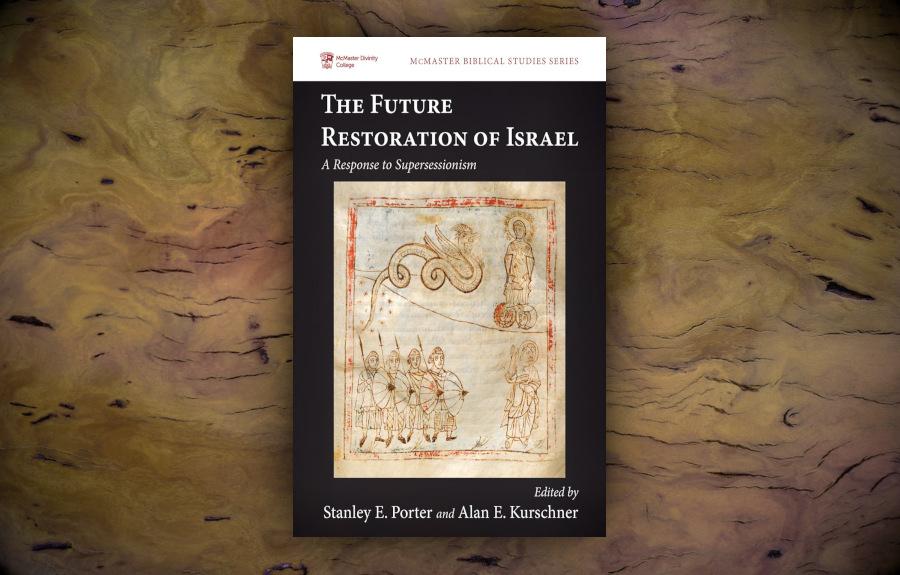A Review of ‘The Future Restoration of Israel’ (Part 4)
Image

Read the series.
With a book the size of this one it is not possible to offer comprehensive comments on every chapter. William S. Campbell wrote the article on “Covenant and the New Covenant” in IVP’s Dictionary of Paul and His Letters. His chapter provides a close study on Paul’s understanding of Israel from Romans 9 – 11. Campbell does not believe one should treat these chapter as “a digression from the central focus of the letter” (201). I go backwards and forwards on this issue. What I see are definite continuities (esp. with Paul’s argument in Rom. 3 – 4. See 198-201), but there are obviously some discontinuities owing to the fact that the question of Israel’s promises comes into view.
In his piece Campbell carefully shows that Israel qua Israel is differentiated from the ethne (Gentiles) in Paul’s thinking. Thus,
The line of Jacob is both by promise and fleshly descent…The statement in Rom. 9:8 “…it is not the children of the flesh who are the children of God, but the children of the promise are reckoned as his [sperma] is not a general declaration that applies outside of the Abraham, Isac, and Lacob line of descent. This is a specific commentary on this particular line, only indicating that, though others are related to Abraham and to one another, and thus count as his tekna (children), they are not reckoned as sperma (i.e., within the line of promise). (205)
And so:
Israel’s beginnings reflect her unique calling by God. But having been called Israel becomes a social reality, not an ideal group, or only a spiritual entity without the normal characteristics of peoplehood. Thus Israel, even though called into existence, becomes an ethnos like other nations, whilst still differing greatly because of their covenant with God. (207)
Although Campbell is unwilling to commit to any precise view of how Israel look in the eschaton (211), they must be a reality there otherwise God cannot be trusted: “The faithfulness of god that underlies and underwrites the covenant is the foundation of all confidence in those who trust him” (213).
This is a finely poised piece of writing, with many insights. I could have done without the excessive alternate readings, but Campbell delivers the kind of article that makes one think, which is what a good article ought to do.
Up next is co-editor Stanley Porter’s study of Romans 11:26 (“and thus all Israel can expect to be saved”—his translation) in which he first gives the four main understandings of Paul’s meaning in contemporary literature (218-223) before giving a fifth view which frankly I found confusing. Porter seems to believe that the “new Israel” incorporates both Jews and Gentiles but is not the Church, yet he rejects what he calls “the eschatological view” which places fulfillment in the future (220-221, 228-229). He does claim that in Romans 9 – 11 the Church is not under consideration in these chapters (225, 228). He says that his intention was only to give an outline of his argument, but more detail was needed for me to fully grasp its implications.
David Rudolph writes on the 1 Corinthians 9:19-23 and 7:17-24 and how the Apostle understands the continuity of true Judaism within his ecclesiology (“L’Dor Vador”—the passing on of Jewishness). There are some good things here (e.g., 246) but I always find myself a bit bogged down in Rudolph’s assertions. Still, he is dead right to claim that if supersessionism in any form (see Wright below) is correct then it naturally leads to the disappearance of Israel (233).
In “Paul between Supersessionism and Pluralism” J. Brian Tucker takes on N. T. Wright’s position that “the church is a continuation of Israel in a new stage of its existence” (260). This, of course, is a common assertion one meets with today. The core of Tucker’s response is his treatment of Romans 9:26 (265-267) and his argument for Israel’s ongoing covenantal identity in Romans 11:26 (268-271). I liked the essay, but Tucker is far too genteel. He should be more assertive.
There follows two articles about Galatians. The first one by Michael Brown tackles Galatians 3:16 and is good at the beginning and the end, though falls a bit flat in the central portion. David Yoon’s grammatical analysis of the use of kai in Galatians 6:16 together with what he means by “the Israel of God” is solid and informative, although perhaps a little tentative. I believe strong arguments have been made for the premillennial view, including the common sense position that if Paul was referring only to the Church in this text he, by clumsy grammar, basically undid everything he argued so strenuously for in the rest of the epistle. The Judaizers would have pounced on him calling the Church “the Israel of God” and pushed through with their circumcision agenda.
Dr Reluctant Articles
Reposted from Dr. Reluctant.
Paul Henebury Bio
Paul Martin Henebury is a native of Manchester, England and a graduate of London Theological Seminary and Tyndale Theological Seminary (MDiv, PhD). He has been a Church-planter, pastor and a professor of Systematic Theology and Apologetics. He was also editor of the Conservative Theological Journal (later Journal of Dispensational Theology). He is now the President of Telos School of Theology.
- 108 views


Discussion